The power of automation in MLM: A proven roadmap to success
Introduction
Direct selling businesses are steadfast in adopting novel technologies to satisfy their customers and achieve better business outcomes. In the customer-centric era, businesses are keener on providing customers and distributors with all the ease and comfort they need with the support of front-end technology. From automating basic processes like user registration to advanced process workflows, direct selling brands are experimenting on futuristic technologies to gain a competitive edge in the fast-paced digital era. Automation has widely helped businesses of all shapes and sectors cut down on operational costs and help resources save time and effort. That being the basic benefit of automation in businesses here are some advanced ones to investigate.
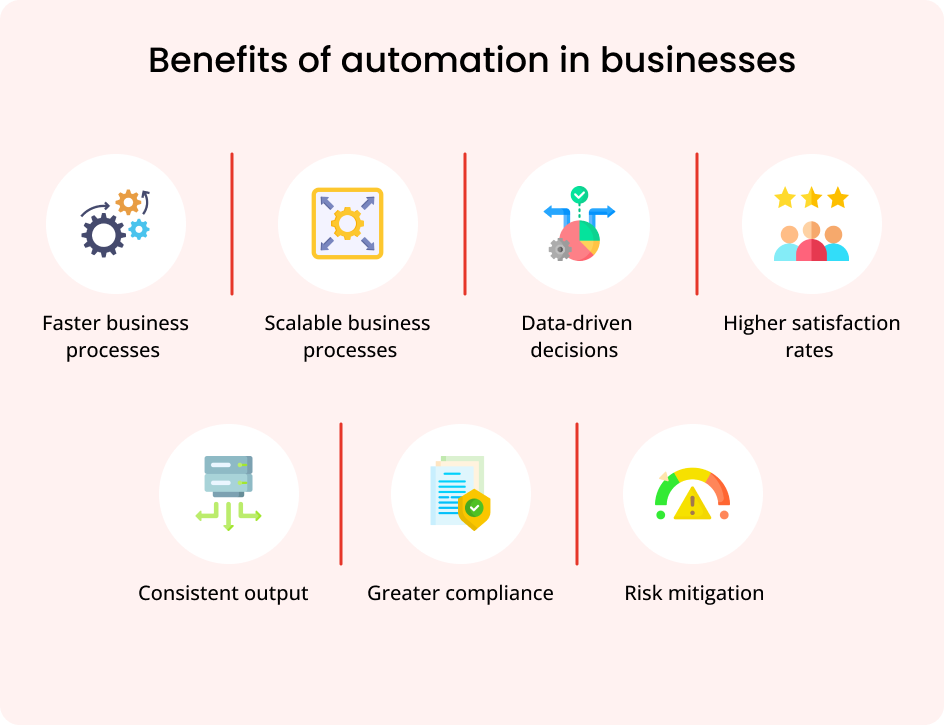
Faster business processes: Automation has accelerated business processes replacing time-consuming manual tasks with smarter and efficient software solutions. Businesses experience increased productivity and reduced turnaround times with automated business processes.
Consistent output: Automation streamlines all business processes for consistent business outputs. It reduces manual errors and optimizes processes for improved efficiency. As opposed to manual processes, automated processes are more accurate and reliable.
Data-driven decisions: Automation has expedited the decision-making process by helping businesses derive insights from various business processes and parameters to skillfully tackle many enterprise management challenges.
Higher satisfaction rates: Chatbots, automated response systems, and personalized customer services, round the clock, has notably improved brand trust and loyalty resulting in higher customer satisfaction rates.
Scalable business processes: Automation can scale business processes giving businesses the needed flexibility to adapt to changing business demands. This lets businesses adapt quickly to changing market conditions, customer interests, and competitions.
Compliance: Monitoring and managing compliance standards have become increasingly easy with the advent of automated compliance mechanisms. Automated compliance monitoring systems help businesses stay compliant across various processes, countries and industries.
Risk mitigation: Businesses can rightly identify and mitigate potential risks on grounds of data privacy and cybersecurity that might otherwise hamper their growth. Automated security systems are also equipped to handle real-time disaster recovery in the event of an attack.
This paper presents a comprehensive analysis of how automation has transformed MLM businesses. Exploring the impact of automation across core MLM processes including distributor onboarding, training, sales, commission calculation, and compensation plan management, the paper highlights the importance and the need for automation in multilevel marketing.
Automation and MLM: Analyzing the need and impact
Software needs in MLM has seen numerous transformational shifts across the decades. While businesses strive to adapt to the changing technology trends, the ever-changing technological landscape has posed several challenges. Businesses like MLM, with so many complex business processes adopt new technologies with much caution. Growing distributor and customer network, endless commission calculations, and MLM plan customizations, all made manual processes more complicated and error prone. Complex compensation plans with even more complex commission structures have tapped MLM businesses off their resources and finances.
In such a complex business environment, automation can empower MLM businesses in more ways than one. Apart from enhancing efficiency and productivity, it can contribute largely to the performance development of distributors elevating business value to the forefront. Analyzing individual MLM processes, it becomes evident that automation is crucial for optimizing the scalability and streamlining operations for businesses to operate smarter in the dynamic marketplace. Automation in MLM has the following outlined benefits.
Enhances distributor productivity
MLM businesses expand with expanding distributor base. Thus, it becomes imperative for businesses to fortify their distributor skills to foster long-term retention and to enhance the brands profitability. With automated business processes, distributors can relax themselves from time-consuming manual tasks and concentrate on building their personal and professional skills.
Reduces customer acquisition costs
Brands run head-over-heels to attract new customers. Finding the right target audience, reaching out to them, and converting them to long-term customers are the underlying concerns in the MLM customer acquisition process. By streamlining marketing and sales processes through automation, organizations can substantially cut down on their customer acquisition costs, contributing to an improved ROI.
Improves customer and distributor engagement
Brand engagement is the mainstay for businesses to trespass changing customer preferences in an excessively competitive market. Automated campaigns and personalized interactions contribute to multi-channel engagement. Advanced automation presents businesses with increased customer and distributor engagement rates through cross-channel gamification and hyper-personalized brand experiences.
More accurate commission processes
An exceedingly challenging process in the multilevel marketing business is to design and manage effective commission structures that also reflect on the sustainability of the business in the long run. Even a hairline error can turn catastrophic for businesses, making a significant impact on its revenue. Automated commission management ensures accuracy and real-time payouts, positively impacting distributor trust and loyalty.
Extended enterprise scalability with complex MLM processes
Expanding customer and distributor networks, managing global operations, millions of user registrations, an extensive influx of orders, synthesizing humungous amount of data, all these need an efficient system that can adapt and accommodate evolving business demands. An automated MLM system with scalable infrastructure can reduce workload and maintain a consistent process workflow.
Ensures hassle-free MLM enterprise management
Persistent enterprise management challenges have been impediments to business growth. Automated business processes offer businesses the assistance and authority to foresee forthcoming challenges and devise management strategies efficiently. It also presents businesses with a forecast into the future with intelligent business insights, making it easier for businesses to make proactive decisions.
Data-driven decision making
Extensive data sets are difficult to process manually. Replacing this with automation facilitates businesses with a reliable data analysis process that delivers actionable insights to optimize the brand’s decision making process. This synergy empowers businesses to optimize operations, forecast trends, and allocate resources efficiently.
Compliance management
At a time when privacy and security are at stake, automated compliance systems can elevate brand trust and transparency through effective data handling and by aligning to regulatory environments. It monitors and ensures that businesses stay compliant at all times to the changing regulatory landscape in the global marketplace.
Redefining MLM processes with automation: The MLM software advantage
Multilevel marketing is a business model that relies heavily on relationship building. That being said, automating a business as MLM needs many belts and braces. The software demands of the MLM industry are diverse with brands preferring to maintain the warmth of personal relationships. Automation in MLM should retain not replace this human essence. Hence a competent MLM software that balances human expertise with advanced technology is required to handle the intricacies of the business.
An automated MLM software blends the positives of humans with that of technology, making it the most compatible pair. MLM software takes a holistic approach towards building a brand through advanced technology. Here are the key MLM processes that can be automated with an MLM software.
Compensation plan management
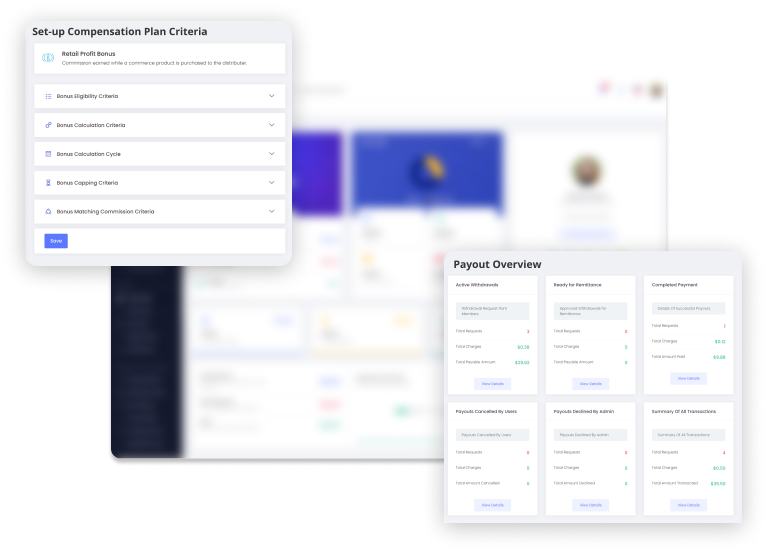
MLM compensation plans, the backbone of any MLM business, needs to be well-built, structured, and maintained to ensure optimum performance. Apparently, one of the first decisions before launching an MLM business, compensation plan, must be well-researched with its effect on the business and on the market properly and promptly analyzed and monitored.
MLM software equips business to handle an efficient compensation structure through its plan automation feature. Automated MLM compensation plan systematically reduces time for errors and optimizes the compensation plan to suit business growth. MLM software comes with a single integrated plan or can be customized with any compensation plan according to the demanding business landscape.
MLM software comes integrated with the following MLM compensation plans:
Binary plan
Matrix plan
Unilevel plan
Generation plan
Monoline plan
Board plan
Stairstep breakaway plan
Hybrid plan
Each of these compensation plans is distinct with its own rules and features. The bonus and commission structure of binary is different from that of matrix. An automated MLM system can easily scale and accommodate any plan the business demands. Apart from automating commission and bonus payouts, the MLM system automates rank advancements, promoting the distributor automatically based on a preset rank criterion.
Commission management
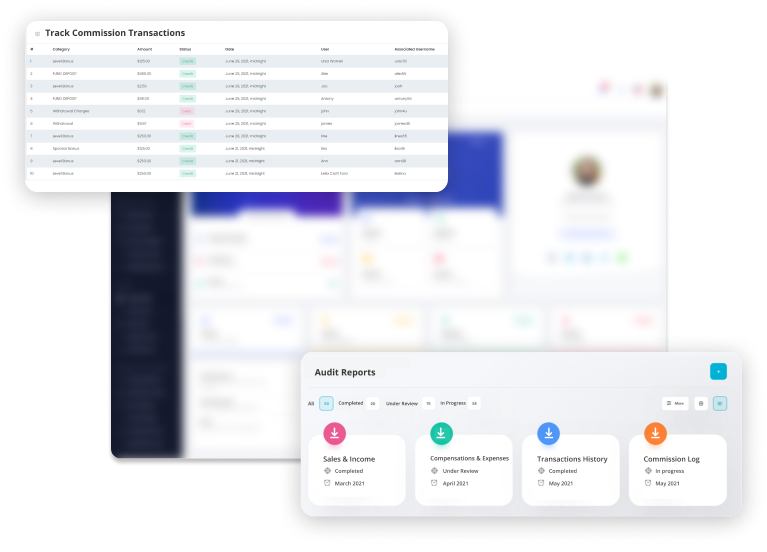
Endless commissions and bonuses that govern MLM businesses get increasingly complex as the business grows. MLM software help manage these complexities enhancing the accuracy and efficiency of the process. It often comes with an integrated commission module designed exclusively to manage an end-to-end commission process. From configuring to automating payouts, this module helps business admins handle commission payments with ease. MLM commission calculator, an add-on feature, facilitates estimated commission calculation before finalizing on the commission structure. By providing inputs such as currency, joining package fee, number of levels, and bonus percentages, admin can get an approximate of the maximum profit they could make with the commission structure. This helps modify the current structure or introduce a new structure if necessary.
Features of an automated commission management module include
Automated commission payouts
Multicurrency feature
Multiple payment methods
Customizable commissions
Analytics and reporting
Report generation
Commission module helps MLM companies ensure accurate and real-time payouts thereby improving distributor motivation and trust. Admins, distributors, and top leaders can generate reports based on various filters such as commissions earned, commissions withdrawn, team sales, and much more. Commission analytics feature gives businesses a comprehensive forecast on the performance of commissions, its impact on the company’s profitability, and need for improvements if any.
Lead generation
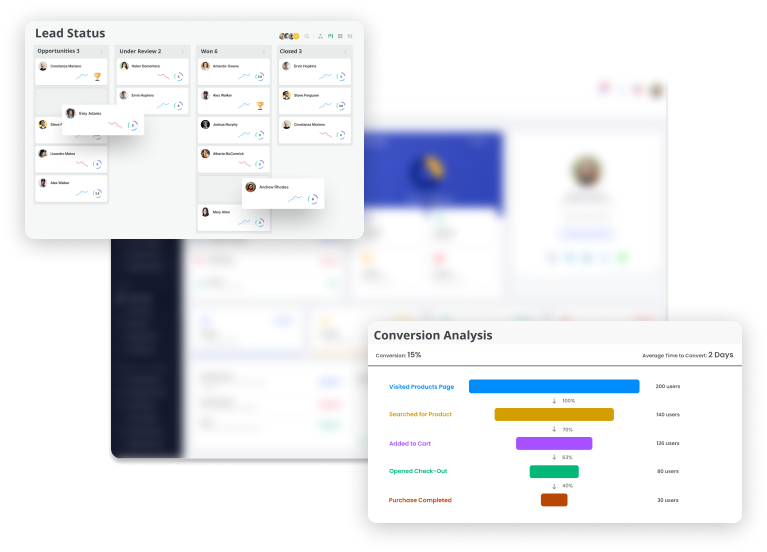
Attract, engage, convert, is the commonly heard motto of lead generation. But how? Is the one question that leaves MLM companies baffled. MLM software helps fight this dilemma with new age tools and effective lead generation techniques. Finding the right source, enhancing its efficiency, and reaching out to the right people are the impediments in the lead generation process.
An automated lead generation funnel can route quality leads straight to the CRM. In the CRM, it undergoes an efficient lead scoring process that filters, prioritizes, and assigns high quality leads to the sales team. The team can create buyer personas depending on the data from the lead funnel letting businesses indulge in a granular targeting of high-quality leads. Predictive lead scoring techniques help analyze the demographic, geographic, and psychographic attributes of leads to create optimized target campaigns.
MLM genealogy tree
Genealogy tree visualizes the entire MLM network in a tree model. Starting with business admin at the top, distributors are arranged according to their ranks or levels. Automated MLM system places new distributors automatically in specific tree positions depending on the compensation plan adopted. Uplines can also choose to place their downlines in favorable positions to increase their profitability. Automated genealogy management arranges every new distributor and lists them in the genealogy tree with all the details such as name, sponsor, enrolment package, rank, commissions earned, etc. The details can be viewed with just a hover or click of the mouse.
Sales tracking and reporting
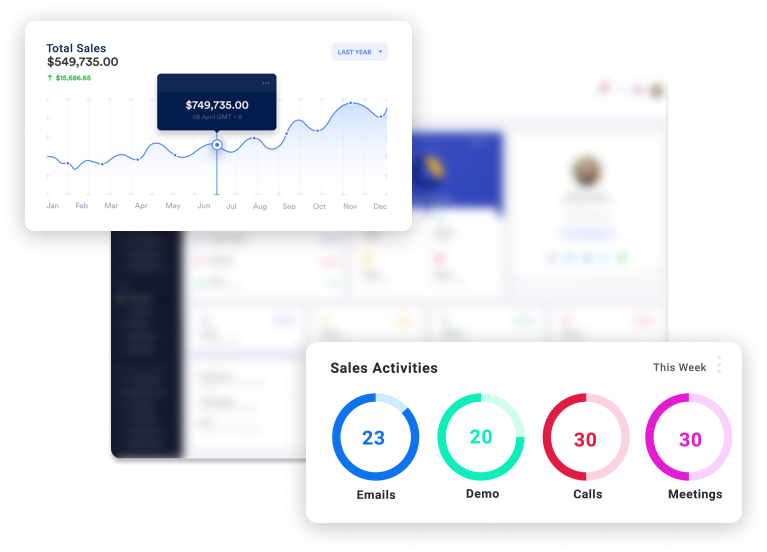
Analyze and understand every possible step in the sales process with advanced sales tracking and reporting tools. The out-of-the-box tools give an unparalleled view of the entire sales process from conversion to future predictions. MLM software automates the tracking and management of both individual and group sales. It also lets admins and top leaders analyze the sales performance of individual distributors and identify low performers and bottlenecks. This data can be put to good use for optimization of future sales campaigns and sales enablement strategies.
All businesses need to do is to identify their key sales metrics and KPIs to track, such as sales conversions, commissions generated, rank advancements, bonuses, etc. Insights derived from these reports help businesses make strategic business decisions. The system helps generate custom reports from the CRM with all the data businesses need. Automated report scheduling generates reports at regular intervals like daily, weekly, monthly, etc.
Marketing
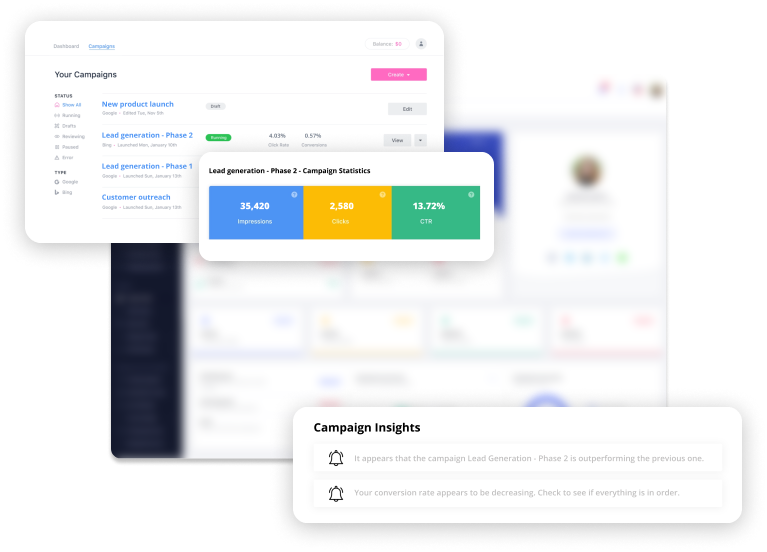
Automate brand awareness and extend brand reach through an array of automated marketing tools. Another astounding effect of automating omnichannel marketing activities is that it saves costs, resources, and ensures consistent customer reach.
With an automated marketing solution, marketers can schedule and launch automated drip campaigns, email marketing campaigns, and all social media activities with less time and effort. The system is also capable of auto-monitoring brand compliance by regulating marketing content that is posted by distributors from the system through keyword filtering feature.
The highlight of marketing automation is the marketing performance insights that the system delivers. These insights can be leveraged to measure the effectiveness of marketing campaigns. Businesses can also a/b test their ideas with the automated system and make data-driven decisions.
Automate your marketing efforts and optimize scalability with a growth-centric MLM platform.
Request demoEcommerce
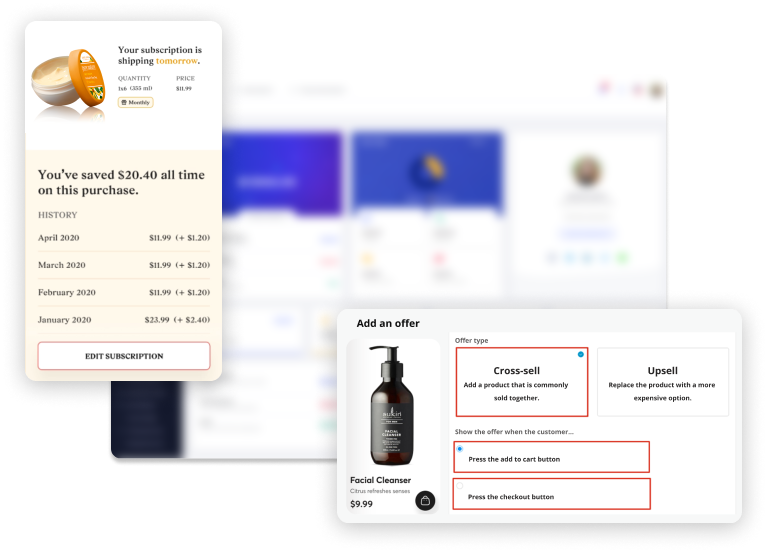
Ecommerce is something that cannot be disregarded for businesses operating in the online marketplace. For MLM businesses, automating ecommerce has the following advantages.
Enhanced shopping experience
Faster checkouts
Easier subscription management
Hassle-free MLM plan integrations
Automated commission payouts
Increased customer satisfaction
Data from the ecommerce store can be streamlined with CRM to derive analytical insights on customer preferences, shopping cart abandonment, and estore engagement.
Distributor onboarding and training
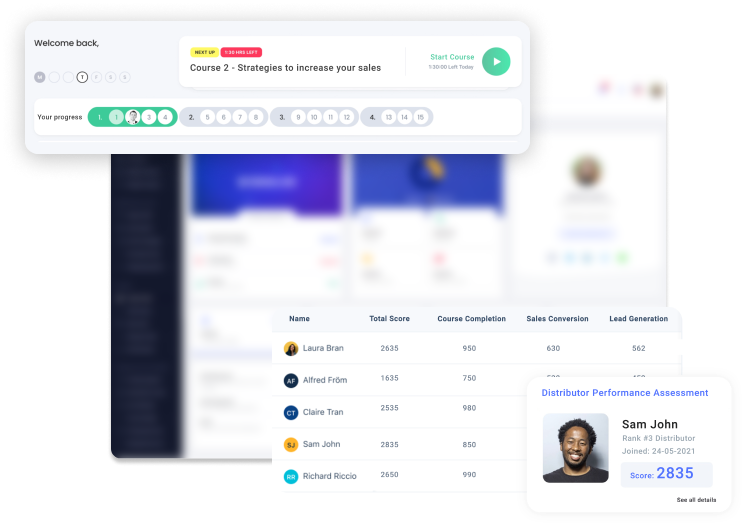
Onboarding is a crucial step in the distributor’s brand journey. Automating the onboarding process presents distributors with a faster and seamless onboarding experience. Brands can leverage the potential of automation to give distributors a personalized onboarding experience through welcome emails and brand intros.
In the distributor training arena, automation can take distributors through an immersive and interactive learning process. Automation supports both fast and slow learners. Distributors can choose to complete their training sessions at their own pace by choosing fast-paced training programs or micro-learning modules.
The system automatically sets targets, goal road maps, and certifications to encourage distributors in their learning process. Admins can measure the progress of distributors through regular automated assessments and identify gaps and low performers. This lets businesses introduce special skill programs for those lagging behind, giving everyone the opportunity to learn, experiment, and succeed.
Inventory management
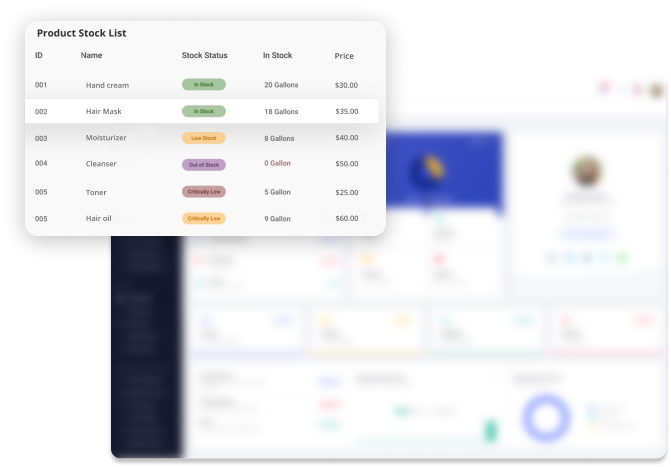
Proper management of inventory is crucial for brands to steadily cater to the customer demands. It complements the supply chain process ensuring timely order fulfillments. An efficient inventory management system reduces dead stock and stockouts. Automating inventory management presents businesses with an increased visibility into their stock levels. It lets businesses handle their customer orders more efficiently. Brands can easily identify fast-moving products, customer preferences, and market trends, and tailor their production and distribution accordingly.
Automated inventory management scales with expanding business growth. A centralized inventory management system streamlines product stock across multiple warehouses. Companies can effectively track and monitor their stock levels in real-time across all sales channels.
Automated inventory management lets businesses
Track multiple warehouses
Forecast inventory
Generate reports and insights
Increase stock visibility
Stock management across various touchpoints
Customer relationship management (CRM)
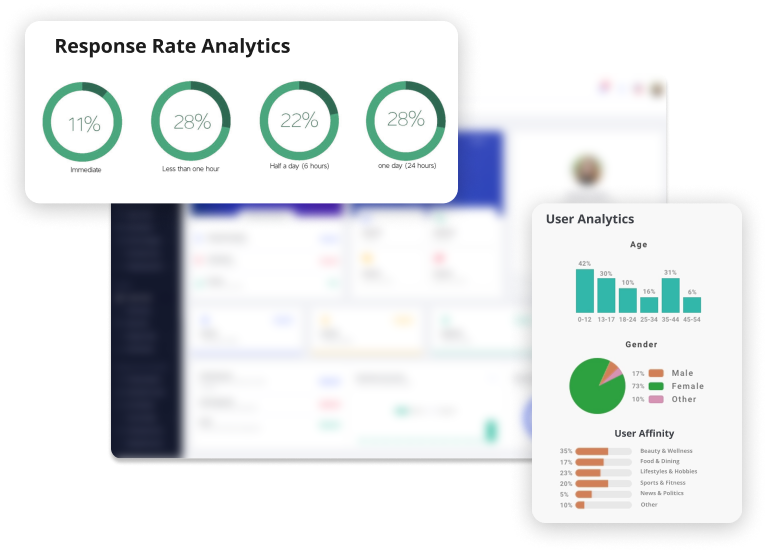
CRM today has transcended the customer service domain to optimizing core business operations for improved visibility and productivity. The capability of an automated CRM system does not restrict itself to customer support and issue resolution alone. It streamlines multiple business processes to generate a unified view of the business’ productivity. Some of the core processes connected to the CRM are lead tracking and management, automated follow ups, analytics, sales, and marketing.
In the customer service domain, CRM automation ensures real-time customer support through chatbots and automated response systems. Automation empowers CRM to effectively handle customer concerns through a streamlined support ticketing system. Tickets once logged are routed to the designated team for faster issue resolution. It acts as a centralized data repository providing customer support agents with past customer history to effectively handle their present concerns.
Compliance monitoring

MLM businesses operates with much caution in a high regulatory environment. Automated compliance monitoring system help ensure that the brands comply with industry regulations such as GDPR, CCPA, HIPAA, etc. Automated compliance tracking carefully analyzes and notifies the brand in case of any negligence in complying with the standards.
The system auto-scans distributor agreements, income disclosure statements, and compensation plans to ensure that it stays compliant under the changing business conditions. The legal and regulatory updates are monitored at regular intervals to ensure that the businesses stay current with the compliance policies.
Replicated websites

Distributors can automatically generate replicated websites to take their brand efforts further. These automated websites can be customized and employed for individual marketing purposes. It acts as a standalone ecommerce store where distributors can view store analytics, manage inventory, and derive customer insights to improve their customer approach.
Data security
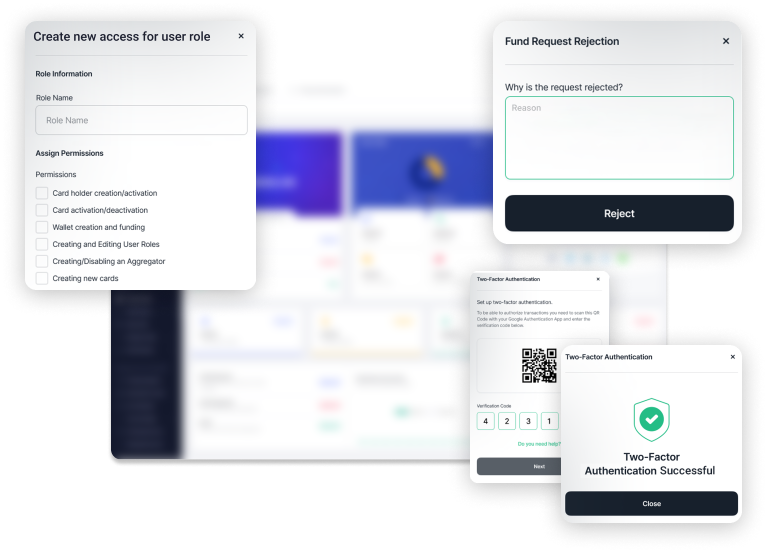
MLM is a business that involves massive amounts of data. While brands go haywire securing distributor and customer interests, data security is often compromised. Automated security systems identify and mitigate threats and attacks thereby safeguarding sensitive customer and distributor information. Robust data encryption methods and role-based access controls guarantees optimum security while reducing unauthorized access and security compromises.
An automated MLM software can expedite the security measures through Multi-factor Authentication (MFA) and Intrusion Detection and Prevention Systems (IDPS). These methods detect and respond to threats in real-time helping businesses stay secure.
Global expansion
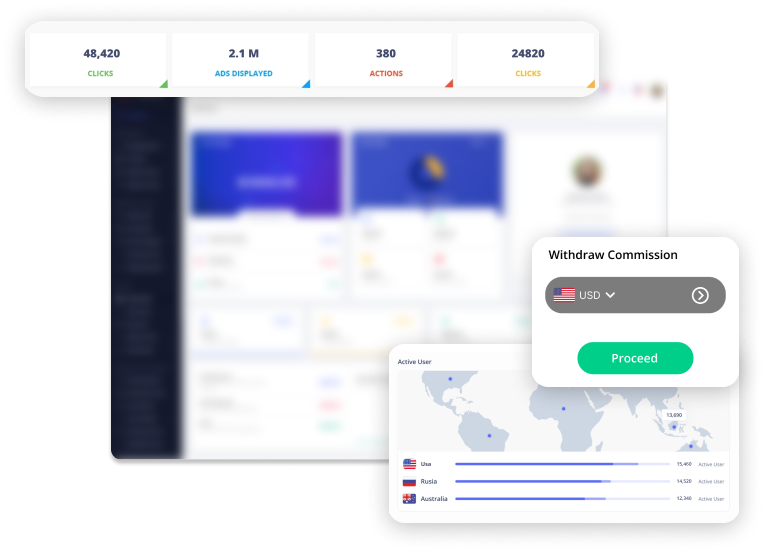
Internationalization features integrated in the MLM software equips businesses to effortlessly operate in the global marketplace. The automated platform supports multiple currencies, languages, and payment gateways that switches automatically with changing IP addresses. The system auto updates tax and privacy policy regulations helping businesses stay compliant with the legal and regulatory compliance of the operating countries.
Customer success stories: How leading MLM companies are navigating success
Future trends that will transform MLM automation
Technological landscape is evolving fast—businesses grow faster. Technology should have the capability to accommodate and scale with business growth. As new trends evolve and give room for bigger business expansions technology must complement the process and lead businesses in the right direction of growth. With changing customer and market preferences there is a lot more to add.
Here we have curated few of the most popular tech trends that are expected to transform the MLM automation arena in the future.
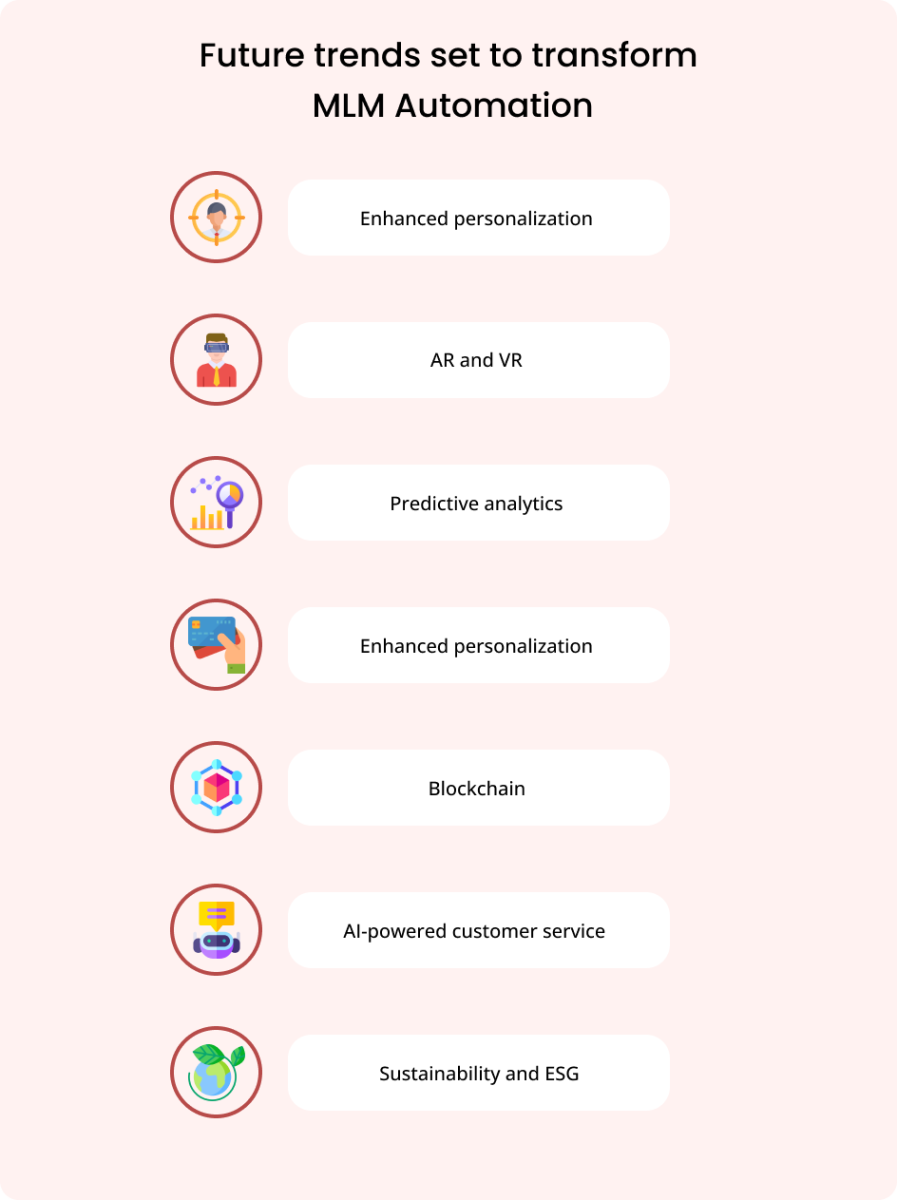
Enhanced personalization
Tailoring interactions, products, and services to befit unique customer preferences and interests is what personalization is all about. But, today with every business launching a personalized customer approach, it is difficult for brands to beat the competition. The future of automation in providing a personalized approach is wide and impactful.
What brands must foresee is the future personalization trends that will keep them competitive and competent in the global marketplace. With AI, machine learning, and data analytics holding the leash, automation will enable businesses to analyze large sets of data in real-time and deliver hyper-personalized experiences through content, product and service recommendations, that are tailored to match individual interests and preferences.
Blockchain
The decentralized technology is sure to revolutionize the MLM industry by enhancing transparency, security, and efficiency. Blockchain can positively impact a wide array of automated MLM processes. Here are an important few to count on.
Smart contracts: These self-executing contracts will find a reliable place in MLM across distributor agreements, income disclosure statements, and other financial transactions, ruling off the need for intermediaries.
Supply chain: Blockchain will accelerate real-time visibility of supply chain processes improving efficiency in verifying product authenticity and traceability.
International payments: Block-chain based global payment systems can ensure faster, reliable, and cheaper transactions without any complications.
Digital security: Blockchain will redefine security systems with automated identity verification processes, promising businesses with enhanced security and privacy.
AR and VR
Emerging technologies as AR and VR have already made remarkable contributions to the direct selling industry by giving customers an incredible brand experience. Other than shopping, AR and VR can impact the following MLM processes.
Distributor training and onboarding: Both augmented reality and virtual reality can be employed to give distributors a realistic and interactive training and onboarding experience.
Customer engagement: AR and VR can create engaging experiences for customers through interactive product catalogs and demonstrations. Virtual reality enables customers to customize products and services virtually providing them with a personalized purchasing experience.
Customer support: Augmented reality can present customer support agents with visual instructions to address customer concerns. It facilitates remote assistance by guiding customers through troubleshooting steps and providing them with real-time solutions.
AI-powered customer service
Artificial intelligence can elevate brand trust through a streamlined customer support process. By employing advanced AI algorithms, machine learning, and natural language processing, it presents customers with an enhanced and personalized customer support experience. AI-powered chatbots and virtual agents have already conquered the customer support domain.
AI can transform support ticketing into a real-time affair by prioritizing ticket logs based on the content and urgency, assuring customers with prompt solutions to their concerns. It can also make personalized product recommendations based on customer’s behavior and purchase history.
Natural language processing, a subset of AI, can facilitate human-like interactions while addressing customer queries and concerns. AI through sentiment analysis decodes customer sentiments by analyzing certain word usages helping customer support agents to tailor their responses accordingly.
AI systems are self-learning systems that learn and improve through machine learning algorithms. With more and more data added to its database it becomes future-proof, providing businesses with seamless customer interactions.
Predictive analytics
Automated MLM system with predictive analytics can give business a double check on their efficiency to make faster and reliable decisions. The incredible insights delivered by the predictive analytics model can help companies foresee their future and make data-driven decisions to accommodate their future demands. It can detect patterns in the business, customer behavior, and the market and equip business with invaluable insights needed for optimizing their business, customer, and market strategies.
Predictive analytics can accelerate the sales process by forecasting sales trends helping MLM companies set realistic goals and efficient resource allocation. It can also optimize the compensation plan management process by indicating which commissions and bonuses impact distributor performance favorably. This way companies can structure their compensation accordingly to suit and motivate their distributors.
In the distributor support domain, predictive analytics can hint into distributor attrition by pointing out warning signs like low sales and inactive distributors. Companies can employ effective engagement strategies for these distributors and cut down on attrition rates. It can also help distributors with customer product recommendations based on their customer’s browsing and purchase behavior.
Sustainability and ESG
Automation can instill ethical business practices, elevating the value and scope of MLM businesses. Automated commission process ensures transparency in the way commissions are calculated and disbursed. Automating MLM marketing processes can monitor distributor brand outreaches for content that doesn’t align with brand value.
Responsible social initiatives trigger long-term customer trust and loyalty. MLM businesses can run social initiatives in the MLM system and automatically incentivize distributors who contribute to the cause.
Emerging payment methods
Introducing and automating emerging payment methods such as cryptocurrency, prepaid cards, digital wallets, embedded payments, etc ensure flexibility, reduce transaction costs and provides users with a seamless payment experience. Blockchain-based payments offer MLM businesses secure transactions with global reach and transparency.
Conclusion
This detailed analysis emphasizes how leveraging technology can significantly impact and enhance business processes. The advantages and opportunities of automation in MLM are limitless. In conclusion, automating MLM processes drive business efficiency, accelerates distributor engagement, and enhances customer experience. MLM automation has outgrown from being a trend to becoming a necessity that transforms MLM businesses in the modern business landscape. Strategic implementation of automation solutions for business processes can position MLM businesses for sustained growth in a highly competitive and dynamic industry.
Reduce administrative burdens with an MLM platform designed to automate and simplify your operations.
Request demoEpixel MLM Software anchored 100+ network marketing companies to success through their business process automation in more than 88 countries. Let Epixel MLM Platform revolutionize your MLM business with 100+ proven features intelligently tuned for small, medium, and large enterprises.
